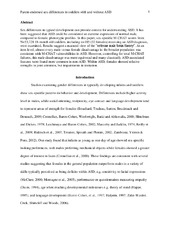Browsing Institutt for psykologi by Author "Volkmar, Fred R."
-
Parent-Endorsed Sex Differences in Toddlers with and Without ASD: Utilizing the M-CHAT
Øien, Roald A; Hart, Logan; Schjølberg, Synnve; Wall, Carla A.; Kim, Elizabeth S.; Nordahl-Hansen, Anders; Eisemann, Martin; Chawarska, Katarzyna; Volkmar, Fred R.; Shic, Frederick (Journal article; Tidsskriftartikkel; Peer reviewed, 2016-10-18)Sex differences in typical development can provide context for understanding ASD. It has been suggested that ASD could be considered an extreme expression of normal male, compared to female, phenotypic profiles. In this paper, sex-specific M-CHAT scores from N=53,728 18-month old toddlers, including n=185 (32 females) receiving an ASD diagnosis, were examined. Results suggest a nuanced view of the ... -
Sex-Differences in Children Referred for Assessment: An Exploratory Analysis of the Autism Mental Status Exam (AMSE)
Øien, Roald A; Vambheim, Sara Magelssen; Hart, Logan; Nordahl-Hansen, Anders; Erickson, Craig; Wink, Logan; Eisemann, Martin; Shic, Frederick; Volkmar, Fred R.; Grodberg, David (Journal article; Tidsskriftartikkel; Peer reviewed, 2018-02-08)The autism mental status exam is an eight-item observational assessment that structures the way we observe and document signs and symptoms of ASD. Investigations of test performance indicate strong sensitivity and specificity using gold-standard assessment as reference standard. This study aims to explore potential sex differences in AMSE test performance and observations of 123 children referred ... -
What are we optimizing for in autism screening? Examination of algorithmic changes in the M‐CHAT
Schjølberg, Synnve; Shic, Frederick; Volkmar, Fred R.; Nordahl-Hansen, Anders; Stenberg, Nina; Torske, Tonje; Larsen, Kenneth; Riley, Katherine; Sukhodolsky, Denis G.; Leckman, James F.; Chawarska, Katarzyna; Øien, Roald A (Journal article; Tidsskriftartikkel; Peer reviewed, 2021-11-26)The present study objectives were to examine the performance of the new M-CHAT-R algorithm to the original M-CHAT algorithm. The main purpose was to examine if the algorithmic changes increase identification of children later diagnosed with ASD, and to examine if there is a trade-off when changing algorithms. We included 54,463 screened cases from the Norwegian Mother and Child Cohort Study. ...


 English
English norsk
norsk

